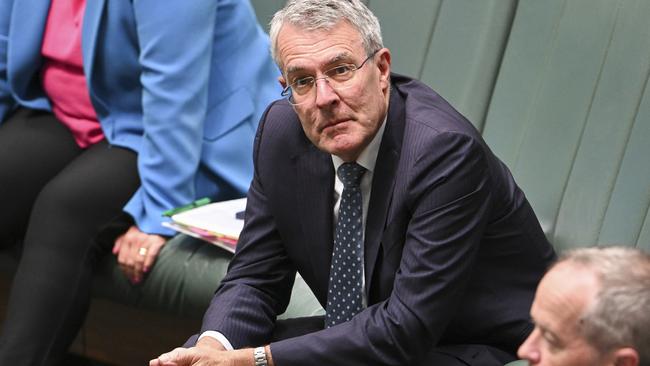Coalition says there can’t be religious discrimination bipartisanship unless Anthony Albanese releases draft laws
Mark Dreyfus and Michaelia Cash will meet for the first time since the government handed over its draft religious discrimination laws on Tuesday.

Anthony Albanese has been warned he cannot achieve bipartisanship on his religious discrimination reforms unless he is transparent and publicly releases the draft proposal, as a growing number of Coalition MPs say the status quo would be better than “something that sets us back”.
Attorney-General Mark Dreyfus and his Coalition counterpart Michaelia Cash will on Tuesday meet for the first time since the government’s draft laws were handed to the opposition last week, to determine if there’s any path forward for negotiation.
The Greens and crossbenchers will also be briefed by Mr Dreyfus, but it is unclear if they will receive a copy of the bills.
Senator Cash, the opposition’s legal affairs spokeswoman, said the government’s process had become farcical as stakeholders and journalists asked the Coalition for briefings about Labor’s legislation.
She called for the draft religious discrimination laws, which include a blanket repeal of section 38 of the Sex Discrimination Act and new protections inserted into a Religious Discrimination Act, to be released as soon as possible, noting the Coalition could speak to stakeholders about them, but was banned from distributing the legislation to third parties.
The Prime Minister has made the passage of religious discrimination laws contingent on bipartisanship with the Coalition.
“If Mr Albanese genuinely wants bipartisan support for his proposals, he needs to have his legislation out there for public scrutiny. This matter cannot be dealt with behind closed doors,” Senator Cash said.
“It appears the Albanese government has left many stakeholders out of the consultation process and others are unsure about what they can and cannot discuss. This is unacceptable … To our surprise and alarm, it seems that many groups simply don’t know what’s in it (the government’s proposal).”
Coalition MPs, who will meet for the final partyroom meetings before the May budget on Tuesday, are able to receive verbal briefings on the draft legislation but they can’t view it.
One opposition MP said there was a growing rump who believed no religious discrimination overhaul was better than “something that sets us back, that’s detrimental”. “If they somehow did something as outrageous as repealing section 38 without providing any guardrails, it’s at that point we’d have to look at fixing it,” the MP said.
The Australian Law Reform Commission’s final report released last Thursday argues that section 38 of the Sex Discrimination Act allowing religious schools to discriminate on the basis of sex, sexual orientation, gender identity or relationship status should be overturned.
Under the proposed change, a new Religious Discrimination Act would be created to give religious institutions the ability to preference teachers based on their faith.
LGBTQI+ groups have called on the government to implement the ALRC’s recommendations.
Mr Dreyfus’s spokesman said the government had spoken to a range of religious institutions, community organisations, unions and legal experts.
“We’re working constructively right across the parliament. We want an enduring solution on this that strengthens protections for all Australians, including students, teachers, people of faith,” he said. “That’s why bipartisan support for this is essential.”
The Australian Federation of Islamic Councils, the peak body representing Muslims, on Monday urged the government to stop any action based on the ALRC’s recommendations until there had been a “full and comprehensive consultation” on the religious discrimination policy change.
“AFIC’s submission to the ALRC underscored the importance of allowing religious communities to operate their educational institutions in ways that are consistent with their faith principles. This includes the ability to make employment decisions and structure educational content that aligns with religious teachings, without the imposition of external values that conflict with their core beliefs,” AFIC president Rateb Jneid said. “It is imperative that the voices of religious communities are heard and that the deep implications of such changes are thoroughly understood. ”




To join the conversation, please log in. Don't have an account? Register
Join the conversation, you are commenting as Logout